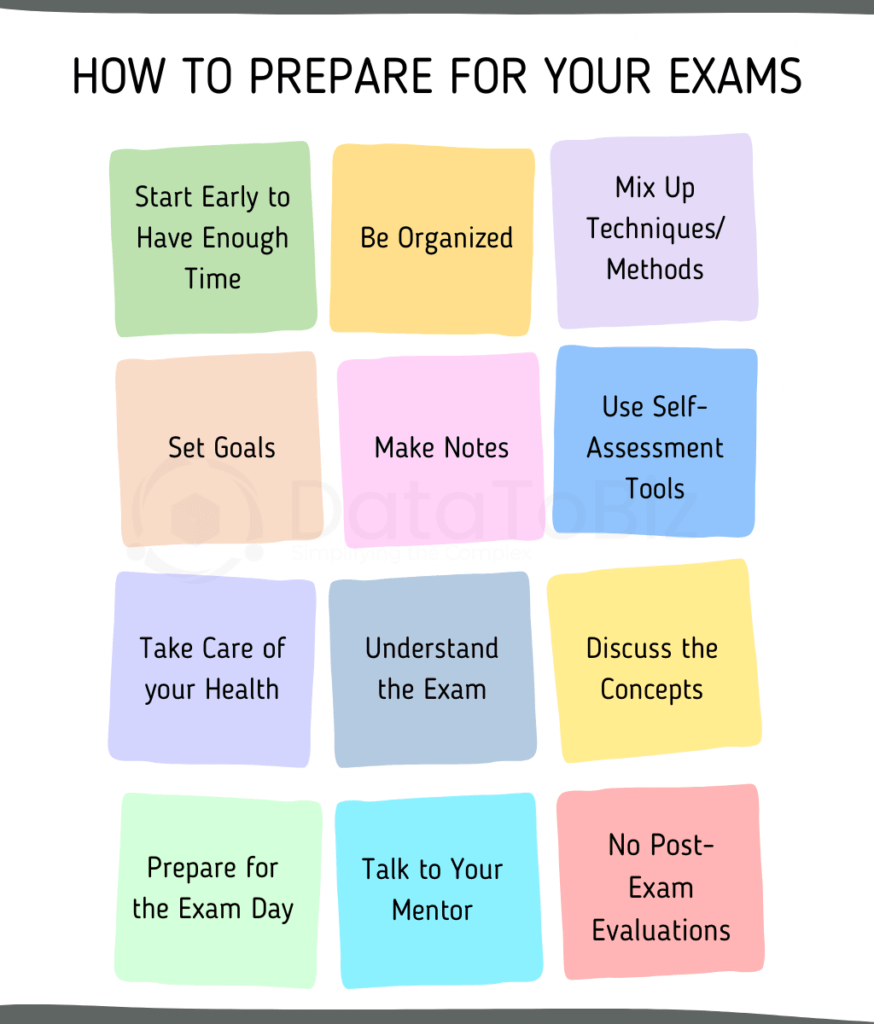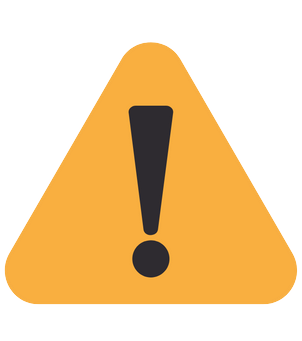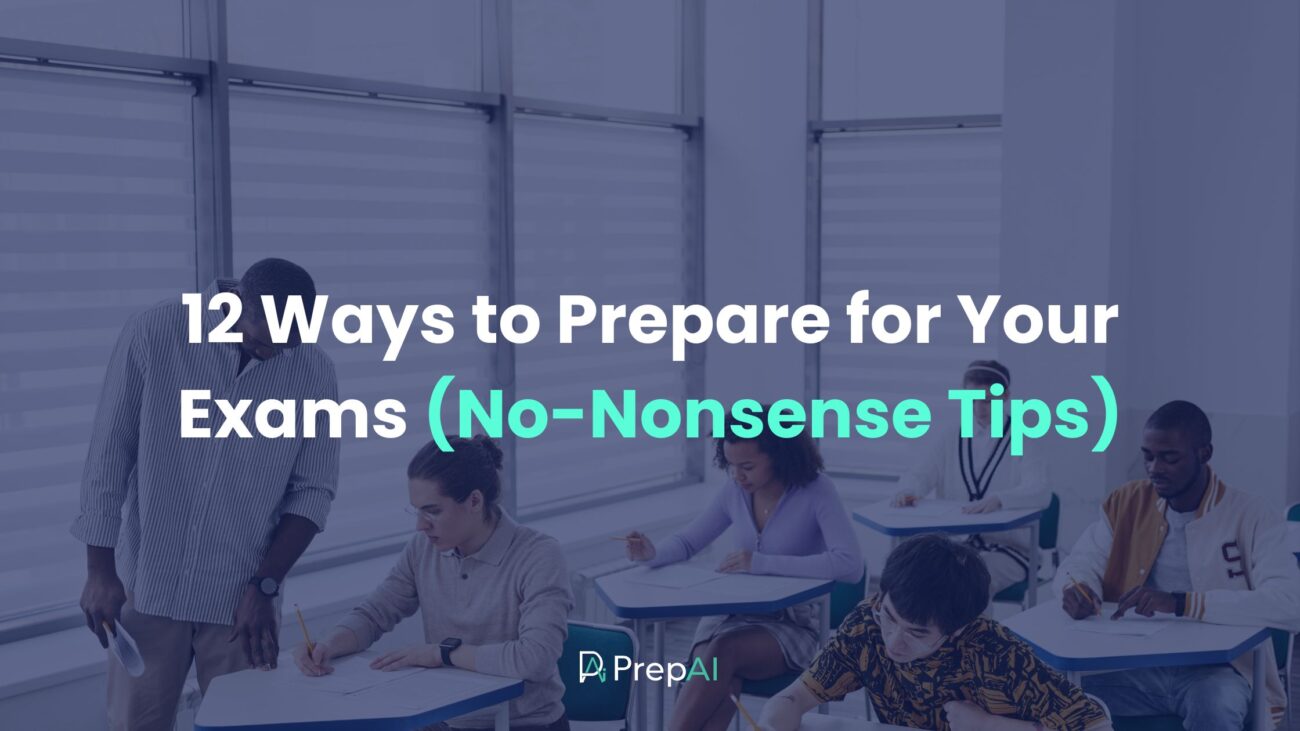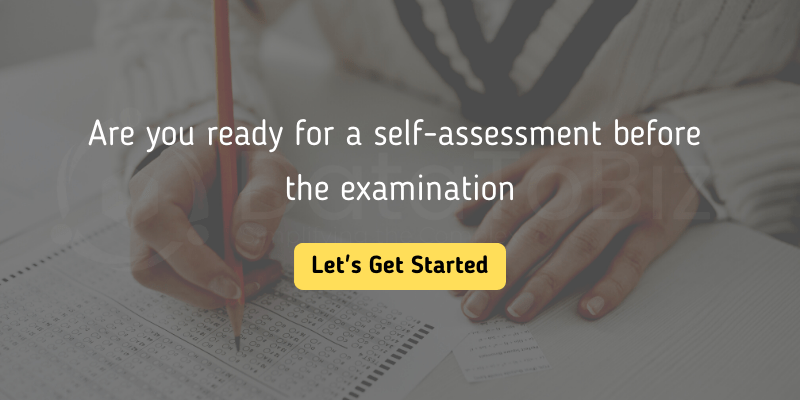Exams don't have to be scary or stressful. With the right approach, you can prepare for your exams and have ample time to revise. We've got some useful and easy tips to prepare for all kinds of examinations and clear them with ease.
The word exam is enough to stress us out. There is so much to study and so little time. The D-day descends upon us even before we know it. Many students feel stressed and panic when exam time is near. We know the holidays follow afterward (and it is assuring), but the hurdle of the exam seems like a huge rock in the middle of the road.
There’s no need to worry about the exam if you plan your approach right. You might have heard this often, and we’ll tell you again. Preparing for exams doesn’t have to mess up your schedule. You aren’t required to shut off from the world or stay away from your favorite shows and games. You only have to manage your time and maybe cut down the time spent on other activities.
So, how to study for final exams? Are there any tips for how to prepare for your exams?
You bet! We have many exam tips to help you plan your time and studies for the final examinations. These tips can be easily followed too. Breathe in, breathe out, and stay calm. Now, read through our list and start following them. Let’s make it easy to study for exams and pass with flying colors.
Tips on How to Prepare for Your Exams
We did our best to make our guide as practical and adaptable as possible.

Start Early to Have Enough Time
This is the trickiest tip to implement, but it is a must if you want to finish revising the entire syllabus on time.
The sooner you start, the slower you can go. Even if you thrive as a last-minute reader, don’t delay things until the night before the exam. Start at least a month before the first exam begins. And if the exam timetable is released earlier, start planning and organizing on the same day. Remember that starting early also allows you to take a day off in between. You won’t feel compelled to read just because you have no choice.
Moreover, when you start early, you have extra time to understand a difficult topic and ask someone to help you with it.
Be Organized
It refers to organizing a lot of things. This involves some planning, so take a pen and paper or open notes on your phone and make a list of things to do.
If you are already into lists, you know the advantage of having a checklist and the satisfaction of ticking an item off it. Start by organizing your study area. Clean your room and study table. Leave windows and doors open to let in the fresh air.
Place the study material on the table according to the subjects and exam dates. Anytime you want to refer to something or cross-check with a textbook, ensure it can be easily found. Searching for the copy will affect your reading. Keep your study material accessible to avoid delays.
Next, depending on the examination schedule, you can start studying in the same order or go in reverse so that by the time you finish revising the last subject on your list, it’ll be time to attend the exam for the same one.
Mix Up Techniques/ Methods
You don’t have to follow only a single study method. While it is important to study in a way that works for you, it’s also okay to try other techniques. When students ask how to prepare for exams, they get multiple answers.
Some swear by studying early in the morning. Some prefer to read late into the night. Others like to study during quiet afternoons. Go with the timing that allows you to concentrate on what you are studying.
Should you listen to music when studying? Should you turn off your mobile phones when preparing for exams? Will it help if you write down everything?
It depends on you. But yes, it is better to minimize distractions. Close the door to avoid sounds or family members talking to you at random. Keep the phone in silent mode and check for messages during breaks. Making notes is also helpful (more on this later).
Different Learning Styles
When you prepare for exams and plan in advance, don’t forget to align the schedule and process with your learning style. Everyone has a personalized learning style. Some need to write to remember. You may also create visual boards highlighting important points. Some learn more in group studies and discussions, while others must be alone in a silent room to study. Start by identifying your learning style. If you aren’t sure what it is, take an online quiz. The VARK questionnaire is a short quiz that helps people to identify their learning styles. Of course, you cannot completely rely on a quiz. Think about how you like to study and list out the details. Then, align this with your exam preparation process. This may seem like extra work initially, but it’s usually a one-time task. It’ll become easier to plan your preparation as you take part in more exams.
Set Goals
Goals are motivating factors. Setting mini-goals to finish the revisions will help you achieve the results. For example, set a goal for the session that you will complete studying a topic thoroughly. Don’t end the session until you do so. Then take a break to relax before starting the next session.
Remember the previous point about lists. You get to strike off one item from that list when you achieve a goal. Sounds cool, right? Just don’t become overambitious and set goals beyond your limit. These will be hard to achieve and demotivating. You might lose interest in preparing for the exams. Don’t compare your study techniques and goals with others. We are working with our limitations, and that’s fine.
Make Notes
Note-making is always helpful as it allows you to concentrate on the topic. However, you do not need to copy everything from the books. The purpose of preparing notes is to get the gist of important points the instant you look at the copy. How you make notes is your choice.
Some write down pointers. Some draw flowcharts and diagrams. Some like to mark important points with a highlighter and take pictures. Do what works for you. This way, you can skim through the notes when traveling to the exam center or right before the exam starts and memorize crucial points for one last time. You don’t have to search through textbooks and study material when there’s no time.
Use Self-Assessment Tools
Studying, revising, and making notes are one part of the preparation process. Another important aspect is self-assessment. Thanks to technology, there’s an easy way to do that. AI-based question paper generator looks like PrepAI can help you create test papers and answers them too.
You aren’t required to spend any more time preparing the question paper. Just log into your PrepAI account, enter the input data, edit the test paper, and save it. The best part is that the AI question generator accepts multiple input formats. You can copy-paste the text, upload documents, or share links to Wiki pages and YouTube videos. The data from the source will be converted into different questions. If you are reading from ebooks, you can copy the content to PrepAI or convert the ebook into a Word/ PDF file and upload it directly.
Next, choose the difficulty level and the type of questions (MCQs, fill-ups, descriptive, etc.), depending on the final exam format. You can edit the questions and add/ delete more questions. Use previous exam papers to create a test for yourself. Save the version you created in PrepAI and export it as a Word document or a PDF file. Print it and start answering the questions as you would do in the exam.
Once done, you can compare the answers with the ones shared by the tool. Simple and effective, right? Therefore, there is no reason to rely on anyone else and can still assess your knowledge.
Take Care of your Health
How will you prepare for qualifying exams if you are not healthy or fit? Students tend to fall sick before or during exams. It’s mainly due to stress, excessive focus on the exam, and not enough care for their personal health. Make sure you stay healthy and don’t let stress affect you. Your daily schedule shouldn’t be so tight that you can’t eat, rest, or sleep.
- Take adequate breaks
- Drink water regularly to stay hydrated
- Go to sleep on time
- Get 8 hours of sleep at night
- Stop studying when you have a headache or body pains
- Go for short walks to get enough exercise
Wellness and Stress Management
Study tips are not limited to learning and should never be. After all, your health is important. We’ve listed a few pointers in the previous tip. Here, we’ll look at how to manage your well-being as you prepare for an exam. Statistics show that more than 60% of students feel stressed daily. Alarmingly, 94% of the US college students feel overwhelmed by the academic pressure. Moreover, the stress levels in students have increased by 30% in the last three decades.
Stress leads to disrupted eating habits, lack of sleep, and other health issues like anxiety, depression, etc. If you are too involved in studies, you won’t have time for physical activity, further affecting your health. So, how can you effectively manage your well-being, especially as the pressure of examinations adds to the stress? Here are a few more tips:
- Meditation (in any form to calm the mind for a while)
- Progressive muscle relaxation (deliberately relaxing the body muscles)
- Build a support network (have friends/ people who understand and can help you)
- Journaling and mindfulness (become less judgmental and reactive)
- Any form of physical activity (biking, swimming, hiking, exercise, etc.)
- Take calming, deep breaths with anxiety builds (this can also prevent panic attacks)
Remember that your health should be a priority. It will take time to incorporate the changes into your lifestyle. Start slow and persist. Over time, you can notice the difference in your stress levels and concentrate better on your studies.
Understand the Exam
If it’s the year-end exam, you’ll mostly be aware of the formatting, duration, etc. But if it’s a competitive exam or something you haven’t attempted before, you need to know more about it. Look for the exam pattern, the types of questions, the segregation of marks, and the duration. Download or buy old test papers and solve them.
This will make you familiar with the test pattern and give you confidence that you can finish the exam on time. With regular practice, you will become more familiar with the format and scoring.
Discuss the Concepts
Studying on your own is a good choice but so is discussing it with friends. We are talking about the famous group studies except that here, you and your friends actually study instead of getting distracted.
Discussing difficult concepts with friends will bring a sense of clarity. You’ll see more perspectives on the same topic and find it easier to understand the intent or theme. You can also explain the concepts to others in your family.
Talking aloud and explaining things will raise doubts and clear them too. It’s no joke that many students swear they understand better when a friend explains a difficult topic.
Prepare for the Exam Day
Be fully ready for the exam day a couple of days before the schedule. Make sure you have the necessary IDs and certificates you need to carry to the exam center. Take stock of your stationery if it’s a descriptive written exam. It doesn’t look good to ask strangers to loan a pen or pencil during the exam.
Pick a dress that makes you comfortable. Consider the season and weather too. If the exam center is not your school/ college, find out the exact location of the building. You can also visit it a week before the exam to find alternate routes. Plan transportation and determine how long it takes to reach the center. That will tell you when you need to start at home so reach the destination on time or a bit earlier.
Talk to Your Mentor
It’s natural to feel anxious as the examination dates get closer. If you are feeling too tense to even concentrate on your studies, it’s time to talk to someone. Who is the person you feel most comfortable talking to? Find someone preferably older and experienced in life, and who has already gone through such situations.
The smartest thing to do is talk to your favorite teacher/ lecturer. Every student has that one favorite teacher they admire and can share their fears without worry. Contact them and ask for advice. Or just share your anxiety with them. They’ll help you calm down.
No Post-Exam Evaluations
There’s one thing you shouldn’t do after the exam. No comparing answers or discussing what you’ve written. No autopsy of the exam paper and your answers. It will stress you so much that you can’t focus on other exams.
It’s too late to do anything once you’ve submitted the answer sheet. Let it go and start preparing for the next exam. After the exam, take some time to unwind and recoup, and then get back to studying.
New Studying Techniques to Try
Are you into semi-scientific approaches to studying? Do you like sophisticated study tips for exams? These techniques might work for you.
SQ3R Technique
SQ3R stands for Survey (skimming the entire book), Question (determine how much you already know and how much to learn), Read (make notes and study), Recite (summarize the contents in your own words), and Review (compare your summary with the original and self-assess). The five steps are performed in the same order when studying to increase comprehension levels. It also allows you to remember and reproduce what you’ve read during exams.
PQ4R Technique
PQ4R stands for Preview, Question, Read, Reflect, Recite, and Review. It is similar to SQ3R but has an additional step where you reflect on what you read and check if you have gained the required knowledge.
Feynman Technique
The Feynman technique is considered to be among the best preparation methods for exams. It is built on the basis that you have truly learned a topic if you can explain it in simple words. When you thoroughly understand a topic, you can explain it without all the bells and whistles. Your explanation will be understood even by a layman with no idea about the topic. For this, you must start by writing everything you know about it and then trying to describe it in your own words. Then, read what you wrote and compare it with the original to make corrections. Then, rewrite it in simpler words by eliminating complex terminology.
Leitner System
The Leitner system is based on the flashcard model and involves multiple boxes, ideally five. Start with box one. As your learning progresses, move the cards from one box to the next. By the end of fourteen days, the cards should be in box five, indicating that you have learned all of it and can present it in the exams.
Resource Recommendations
While we have provided quite a few study tips for motivation and preparation, here are a few recommendations to access study materials and other resources required for the exam.
YouTube Videos
The internet is a great place to find study material in various formats. Visual and audiovisual learners can learn more in less time if they watch a video tutorial or a webinar with experts discussing/ teaching the topic. YouTube has many free videos put up by teachers and former students. You can watch them anytime and make notes for the exams.
Self-Assessment Tools
There are many study help websites with free and paid features. Some platforms offer course materials and other platforms conduct online tests to help students measure their performance. When preparing for exams, you should practice mock tests for self-assessment. For this, there’s no need to rely on anyone except technology. Subscribe to test generation tools like PrepAI and create self-assessments every day.
Libraries (Online and Offline)
Textbooks, study guides, workbooks, etc., can be sourced from libraries instead of being purchased by spending money. A library subscription is less expensive and gives you access to unlimited material. Fortunately, online libraries are becoming quite popular and serve the same purpose digitally. If there are no brick-and-mortar libraries near your place, subscribe to an online library. Indian students can soon avail of the ONOS (One Nation One Subscription) scheme to access countless national and international libraries using a single ID for free!
Mobile Applications
You can also download an exam preparation app to create study notes, flashcards, mind maps, etc. Moreover, some apps have AI chatbots and virtual assistants to make it easy to learn and discuss the topics. Trello is an app to organize notes into neat folders and categories. While high screen time can be counterproductive during exam preparation, using your smart devices for important activities is allowed. Just make sure you don’t hop between study apps and social media or games.
Conclusion
It’s neither impossible nor overwhelming once you know how to prepare for comprehensive exams. Examinations are a part of student life (despite the changing scenario), and with proper preparation, you can stay in control of the situation throughout.
Plan, execute, self-assess, correct, revise, prepare, and present. One step at a time, and you’ll make it to the finish line with ease. Don’t forget to create your account to use PrepAI for self-assessments. Good luck!
FAQs
1. Should you study everything on the day before the exam?
It is not recommended to wait until the last moment to study for the exam. Begin your planning and preparation as early as possible so that you have enough time to learn all the important topics and revise them a couple of times. It also reduces stress and anxiety if you have extra time to study.
2. How to find the right preparation method for your learning style?
One way to find the right preparation method is to accurately understand your learning style. This can be done through quizzes or by discussing it with your teachers/ mentors. Read about different learning styles to understand which feels yours. Then, choose a preparation method that seamlessly aligns with the style and enhances it. You should be comfortable with it.
3. Can you combine multiple preparation methods to get better results?
Yes, you can. In fact, many students use different methods based on the subject, topic, etc., and plan their preparation accordingly. For example, biology lessons might be better when learned using videos. Feel free to combine tips and methods that work for you.







